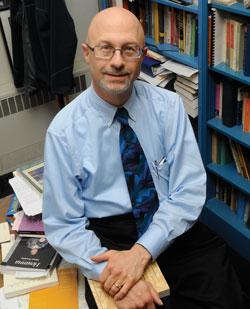
|
After directing the Honors Program for more than two decades, Dr. Ted Steinberg is stepping down from that leadership role, acknowledging that he’s not able devote the time necessary to lead the thriving program and still remain fully engaged in his true passion of teaching.
Steinberg will be succeeded by David Kinkela, assistant professor of History, in January.
“The program has grown from 100 students when I took it over to almost 400 students, and I recommended that the director be made a half-time position, and I didn’t want to give up teaching,” said Dr. Steinberg, a SUNY Distinguished Teaching Professor. “I just love teaching, and besides, who would I tell my jokes to?” the affable English professor, now in his 40th year at SUNY Fredonia, laughed.
Founded nearly 30 years ago by Dr. Minda Rae Amiran, former Dean of Special Studies, the Honors Program provides demanding courses taught by outstanding scholars and teachers. “She sort of handed it off to me, and I’ve loved it, truly,” said Steinberg, who was Associate Dean of Special Studies as well as an English department faculty member when he took the helm of the program 22 years ago.
Popularity of Honors programs is growing at colleges nationwide as students increasingly recognize the enrichment these intensive seminars add to their academic development. “It offers students a little something extra in their education,” Steinberg explained.
Admission into the Honors Program by incoming freshmen is by invitation only, based on high school academic achievement and SAT scores, while acceptance – which carries the designation of Honors student for the successful applicant – is determined by a 1,000-word essay written by the candidate on a book or article he or she found most stimulating.
“All Honors seminars fulfill CCC (College Core Curriculum) requirements, but these are specially chosen topics and, I think, students bring a different level of commitment into the classes,” Steinberg explained. “We’re getting more good students and they
are interested in these challenges.”
Students applaud these seminars for their depth of discussion and exploration into subject areas outside of their academic majors. In fact, once completing four consecutive semesters that is the standard practice, students often want to take another seminar in their junior year.
Seminars can address unique or highly specialized topics. Among the seven seminars to be taught in the Spring 2011 semester are: Photographic Explorations, Civil War Music and Community Identity, and Hot Topics: Writing the Political. On several occasions, Honors topics were later incorporated into the regular curriculum. Seminars are most often taught by faculty in different academic disciplines, but several high-level administrators – including President Dennis Hefner, Vice President for Academic Affairs Virginia Horvath and Dean of the College of Arts and Sciences John Kijinski – have also led these classes.



